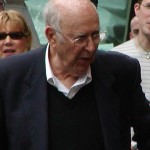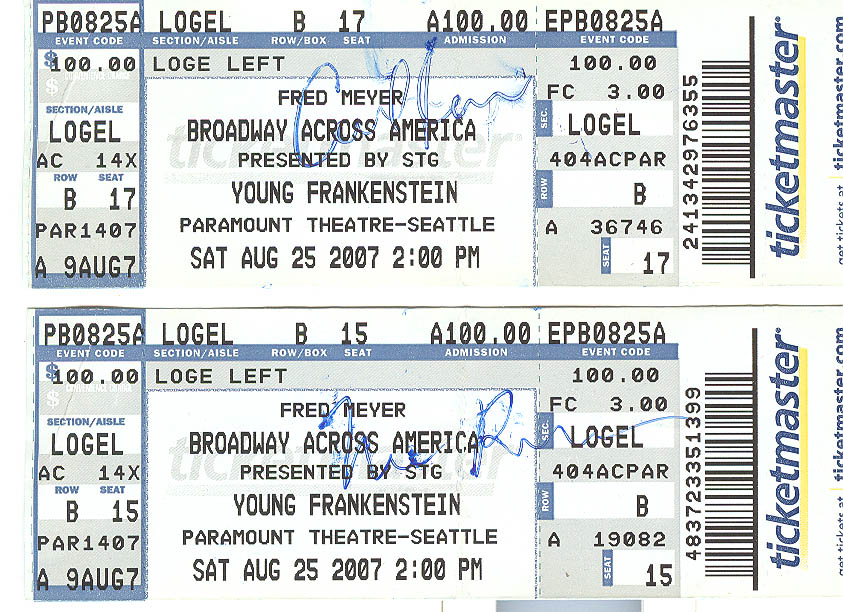Friday, October 10: Bandersnatches
2000 YEAR OLD SIGNATURE
by Steve Steinbock
Happy Friday to everyone. As the sun is rising on my weekly column, I’m aboard an airplane heading toward Baltimore for the 2008 World Mystery Convention, better known as Bouchercon. This afternoon at 1:30 I will be sitting with fellow CBers Angie, Melodie, James, John, and Leigh for a panel on short stories moderated by Alfred Hitchcock editor Linda Landrigan. Stay tuned for details. (Deborah and Rob can’t be there. But they’ll be with us in spirit, if not in effigy).
 Last week, in a comment to my column, James made a joke referencing a line from Mel Brooks’ and Carl Reiner’s famous “2000 Year Old Man” routine. I commented back that I had a funny story about meeting the famous comedians. Then my wife (who ironically goes by “Steve’s Wench” on this forum, but is “She Who Must Be Obeyed” to anyone who knows her) urged me to post the story. So here goes:
Last week, in a comment to my column, James made a joke referencing a line from Mel Brooks’ and Carl Reiner’s famous “2000 Year Old Man” routine. I commented back that I had a funny story about meeting the famous comedians. Then my wife (who ironically goes by “Steve’s Wench” on this forum, but is “She Who Must Be Obeyed” to anyone who knows her) urged me to post the story. So here goes:
In the summer of 2007, I was in Seattle with my two sons when I learned of the pre-Broadway opening of the stage musical “Young Frankenstein” in that city. I managed to chase down tickets to a matinee for me and the boys. When we arrived at the Paramount Theater, I found metered on-street parking nearby, but with a 2-hour limit. We watched the first half of the show with great enjoyment and much laughter, and during the intermission, I dashed out of the theater to shove some more coins on the parking meter.
 On my way back to the theater, I did a double-take when I recognized two men standing outside the stage door. I asked if it would be too much of an imposition, to which Mel Brooks responded, “Yeah, it will. But go ahead and impose anyway.” I pulled out two ticket stubs and asked if they would sign them. When I found that I didn’t have a pen, Brooks responded, “You want we should provide the pen, too?”
On my way back to the theater, I did a double-take when I recognized two men standing outside the stage door. I asked if it would be too much of an imposition, to which Mel Brooks responded, “Yeah, it will. But go ahead and impose anyway.” I pulled out two ticket stubs and asked if they would sign them. When I found that I didn’t have a pen, Brooks responded, “You want we should provide the pen, too?”
Carl Reiner graciously reached into his jacket and took out a pen. “Great, Carl,” said Brooks. “You can sign for me, too.” And that’s just what he did. So I now have two tickets, one with Carl Reiner’s signature, and the other with Mel Brooks’ signature forged by Reiner.
Transcending Genre
Last week I attended an editorial meeting for a magazine on which I serve as a contributing editor. One of the hot items of discussion was how Dennis Lehane smartly ditched the mystery genre with his new historical epic.
Huh?
It was news to me.
Sure, it’s been several years since Lehane’s most recent Kenzie and Gennaro novel. Sure, his new book is quite different in length, setting, and scope. But without having read The Given Day, set during the Boston Police Strike of 1919, it doesn’t look to me as though Lehane has ditched the genre.
Nevertheless, the salon-talk around literary America is that Lehane has risen above detective fiction. The Seattle Post-Intelligencer wrote: “It is this fall’s biggest literary leap: Dennis Lehane going from hard-knuckled crime novels like “Mystic River” to historical fiction with a literary perspective.”
The New York Daily News emphasized Lehane’s departure with the following quote:
“I don’t owe anyone a cookie cutter book fashioned from the last one. . . . I have attempted very quietly to get back into Patrick’s head in the nine years since I left those books. He just stopped speaking to me.”
So has Dennis jumped the genre and dumped his fans? I doubt it. His books have always been literary, in that they are intelligent, thought-provoking, and well written. As my column over the past two weeks – looking through the lens of R. Austin Freeman – suggests, good detective fiction is literary.
Blogger Sarah Weinman, in her review of The Given Day in the Los Angeles Times, agrees. She wrote:
“On the surface, a 700-page epic about the Boston police strike of 1919 seems as much of a curveball as the kind Babe Ruth might have swung and missed at, a head-scratching decision for fans who stubbornly cling to the belief he’ll bring back his beloved but beat-up private eyes Patrick Kenzie and Angela Gennaro for a sixth go-round. But the secret of Lehane’s body of work is how he stretches himself within a tight framework, revisiting key themes over and over in different forms. It is what makes him a standout writer of commercial fiction, regardless of genre guise.”
Weinman gets it. She reminds us that the “tight framework” and the “genre guise” of crime and detective fiction aren’t limiting. The structure is paradoxically a liberating gateway to write beautifully and at the same time tell a story.
Several years ago a popular mystery writer, author of several successful series, announced that she was no longer a genre writer, or so I’ve heard. Her mysteries set in Appalachia brought good storytelling together with a literary flair. But (again, as I’ve heard from many of her former fans and supporters), she felt that in order to be “literary,” she needed to distance herself from “genre.” She was once a familiar face on the cover of every mystery fan magazine. But, like St. Peter, she ditched and denied her fan-base, and they have gone on to other writers. Where is she now? (I had to do some digging, but I found she’s still writing. Her last two books are “literary” novels set amidst NASCAR racing).
I strongly doubt that Lehane will feel compunction to ditch his fan-base. Lehane is a wonderful writer whose skill and style were never dependant on the whims of his fans, as it should be with any writer. But it’s my sense that Lehane genuinely likes the authors and fans, editors and agents that comprise the mystery world, and they like him.
I expect that it will remain so.
See you in a week.





















That most “literary” of writers Charles Dickens wrote for the masses, he was as “pop culture” as Murder She Wrote. He’s lasted and he would be amazed at that! Really hope the panel went well! Brooks and Reiner? WOW! (Or should I say “Good Heavens!”)